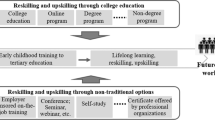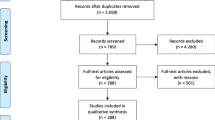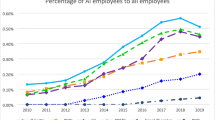Abstract
Organizations across industries face challenges in recruiting the right talent while expending precious resources and time. The complex process of fair screening and shortlisting could be substantially streamlined by deploying automated screening and matching of job applications. This study suggests an analytics-based approach for improving the competitiveness of the human resources recruitment process . Available tools have been used to extract the attributes from the profile job description and match them with prospective candidates' résumé from the database. Similarity analysis identified the most suitable applicant based on the desired attributes vs. resume. The results of the framework were trained on a random sample of 1029 job applicants' profiles of an IT company. It was able to reduce 80% of manual screening efforts. This is expected to directly reflect in a saving of man-hours and allied operating costs. Though the current study is limited to the context of an IT company in India, the proposed artificial intelligence-based framework holds immense potential to be extended across industries. The study contributes to both theory and practice by helping leaders, associations, policymakers, and academia, to strategize and optimize recruitment efforts.
Similar content being viewed by others
Data availability
The research data associated with this paper is available with the first author, and can be accessed subject to confidential agreements as existing with the concerned organization.
References
Al-Ayyoub, M., Khamaiseh, A. A., Jararweh, Y., & Al-Kabi, M. N. (2019). A comprehensive survey of Arabic sentiment analysis. Information Processing & Management, 56(2), 320–342. https://doi.org/10.1016/j.ipm.2018.07.006
Allahyari, M., Safaie, S., Pouriyeh, S., Trippe, E., Assefi, M., & Gutierrez, J. (2017). Text summarisation techniques: A brief survey. International Journal of Advanced Computer Science and Applications, 8(10), 397–405. https://doi.org/10.48550/arXiv.1707.02268
Benuyenah, V. (2022). Rethinking recruitment ethically through the lens of corporate social responsibility (CSR). Evidence-Based HRM. https://doi.org/10.1108/EBHRM-05-2022-0113
Berry, M. (2016). How to fail at HR analytics in 7 easy steps. HR Magazine December, 60(10), 20–21.
Blei, D. (2012). Probabilistic topic model. Communication of the ACM, 55(4), 77–84.
Borges, A. F. S., Laurindo, F. J. B., Spínola, M. M., Gonçalves, R. F., & Mattos, C. A. (2021). The strategic use of artificial intelligence in the digital era: Systematic literature review and future research directions. International Journal of Information Management, 57, 102225. https://doi.org/10.1016/j.ijinfomgt.2020.102225
Breaugh, J. A. (2009). The use of biodata for employee selection: Past research and future directions. Human Resource Management Review, 19, 219–231. https://doi.org/10.1016/j.hrmr.2009.02.003
Canhasi, E. (2014). Graph-based models for multi-document summarisation. A Dissertation: Faculty of Computer and Information Science. http://lkm.fri.uni-lj.si/xaigor/eng/scipaper/AASummarisation.pdf. Accessed 15 Jan 2023. Accessed 23 Sept 2018.
Chen, J., Zhu, J., Lu, J., & Liu, S. (2018). Scalable training of hierarchical topic models. Proceedings of VLDB Endowment, 11(7), 826–839. https://doi.org/10.14778/3192965.3192972
Collins, C., Dennehy, D., Conboy, K., & Mikalef, P. (2021). Artificial intelligence in information systems research: A systematic literature review and research agenda. International Journal of Information Management, 60, 102383. https://doi.org/10.1016/j.ijinfomgt.2021.102383
Devlin, J., Chang, M. W., Lee, K., & Toutanova, K. (2018). BERT: Pre-training of deep bidirectional transformers for language understanding. arXiv:1810.04805. Accessed 15 Jan 2023.
Dwivedi, Y. K., Hughes, L., Ismagilova, E., Aarts, G., Coombs, C., Crick, T., & Williams, M. D. (2021). Artificial Intelligence (AI): Multidisciplinary perspectives on emerging challenges, opportunities, and agenda for research, practice and policy. International Journal of Information Management, 57, 101994. https://doi.org/10.1016/j.ijinfomgt.2019.08.002
Freeman, C. (2014). To maximize recruitment ROI, HR needs to adapt to changing landscape. HR Focus, 91(2), 14–15.
Gao, R., & Shah, C. (2020). Toward creating a fairer ranking in search engine results. Information Processing & Management, 57(1), 102138. https://doi.org/10.1016/j.ipm.2019.102138
Grabara, J., Kot, S., & Pigon, L. (2016). Recruitment process optimisation: Chosen findings from practice in Poland. Journal of International Studies, 9(3), 217–228. https://doi.org/10.14254/2071-8330.2016/9-3/17
Hamilton, W. L., Ying, Z., & Leskovec, J. (2017). Inductive representation learning on large graphs. In: Advances in neural information processing systems (NIPS '17), pp. 1024–1034. https://doi.org/10.48550/arXiv.1706.02216.
Herath, H. M. K. K. M. B., & Mittal, M. (2022). Adoption of artificial intelligence in smart cities: A comprehensive review. International Journal of Information Management Data Insights, 2(1), 100076. https://doi.org/10.1016/j.jjimei.2022.100076
Hu, Q., Lu, Y., Pan, Z., Gong, Y., & Yang, Z. (2021). Can AI artifacts influence human cognition? The effects of artificial autonomy in intelligent personal assistants. International Journal of Information Management, 56, 102250. https://doi.org/10.1016/j.ijinfomgt.2020.102250
Jayaraj, V., & Mahalakshmi, V. (2015). Augmenting efficiency of recruitment process using IRCF text mining algorithm. Indian Journal of Science and Technology, 8(16), 1–8. https://doi.org/10.17485/ijst/2015/v8i16/53381
Ji, S., & Ye, J. (2017). Learning to rank for personalized fashion outfit recommendation. In Proceedings of the 26th international joint conference on artificial intelligence (IJCAI '17), pp. 2357–2363.
Karthiga, G., Karthi, R., & Balaishwarya, P. (2015). Recruitment and selection process. International Journal of Scientific and Research Publications, 5(4), 1–5.
Koch, G., Zemel, R., & Salakhutdinov, R. (2015). Siamese neural networks for one-shot image recognition. In ICML deep learning workshop, vol. 2.
Komkhao, M., Jie Lu, L. & Zhang, L. (2012). Determining pattern similarity in a medical recommender system. Data and Knowledge Engineering, ICDKE 2012103-114. https://doi.org/10.1007/978-3-642-34679-8_11.
Liu, Q., Huang, H., Xuan, J., Zhang, G., Gao, Y., & Lu, J. (2021). A Fuzzy word similarity measure for selecting top-K similar words in query expansion. IEEE Transactions on Fuzzy Systems, 29(8), 2132–2144. https://doi.org/10.1109/TFUZZ.2020.2993702
Malathi, T., Srinivasan, S., & DilliRani, K. R. (2005). Prediction of students recruitment process using data mining techniques with classification rules. International Journal of Computer Science and Information Technology Research, 3(3), 84–87. https://doi.org/10.14445/23488387/IJCSE-V8I3P101
Margherita, A. (2022). Human resources analytics: A systematization of research topics and directions for future research. Human Resource Management Review, 32(2), 100795. https://doi.org/10.1016/j.hrmr.2020.100795
Mikalef, P., & Gupta, M. (2021). Artificial intelligence capability: Conceptualization, measurement calibration, and empirical study on its impact on organizational creativity and firm performance. Information and Management, 58, 103434. https://doi.org/10.1016/j.im.2021.103434
Mohapatra, M., & Sahu, P. (2017). Optimizing the recruitment funnel in an ITES company: an analytics approach. Procedia Computer Science, 122, 706–714. https://doi.org/10.1016/j.procs.2017.11.427
Muñoz, S., Iglesias, C. A., Mayora, O., & Venet Osmani, V. (2022). Prediction of stress levels in the workplace using surrounding stress. Information Processing & Management, 59(6), 103064. https://doi.org/10.1016/j.ipm.2022.103064
Obeidat, S. M. (2017). An examination of the moderating effect of electronic-HRM on high-performance work practices and organisational performance link. Evidence-Based HRM, 5(2), 222–241. https://doi.org/10.1108/EBHRM-11-2015-0046
Pahos, N., & Galanaki, E. (2019). Staffing practices and employee performance: The role of age. Evidence-Based HRM, 7(1), 93–112. https://doi.org/10.1108/EBHRM-01-2018-0007
Pessach, D., Singer, G., Avrahami, D., Ben-Gal, H. C., Shmueli, E., & Irad Ben-Gal, I. (2020). Employees recruitment: A prescriptive analytics approach via machine learning and mathematical programming. Decision Support Systems, 134, 113290. https://doi.org/10.1016/j.dss.2020.113290
Rafaeli, A., Hadomi, O., & Simons, T. (2005). Recruiting through advertising or employee referrals: Costs, yields, and the effects of geographic focus. European Journal of Work and Organizational Psychology, 14(4), 355–366. https://doi.org/10.1080/13594320500183709
Rajani, N. S., Reddy, V. B. A., & Parvathi, A. (2016). Recruitment practices in IT sector: a comparative analysis of select Indian and MNC companies international. Journal of Scientific and Technology Research, 5(4), 257–267.
Rodgers, W., Murray, J., Stefanidis, A., Degbey, W., & Tarba, S. (2022). An artificial intelligence algorithmic approach to ethical decision-making in human resource management processes. Human Resource Management Review. https://doi.org/10.1016/j.hrmr.2022.100925
Stewart, G. L., & Carson, K. P. (1997). Moving beyond the mechanistic model: An alternative approach to staffing for contemporary organizations. Human Resource Management Review, 7(3), 157–184. https://doi.org/10.1016/S1053-4822(97)90021-8
Samuel, J., Kashyap, R., Samuel, Y., & Pelaez, A. (2022). Adaptive cognitive fit: artificial intelligence augmented management of information facets and representations. International Journal of Information Management, 65, 102505. https://doi.org/10.1016/j.ijinfomgt.2022.102505
Sanyal, S., Hazra, S., Adhikary, S., & Ghosh, N. (2017). Resume parser with natural language processing. International Journal of Engineering Science and Computing, 7(2), 4484–4489. https://doi.org/10.13140/RG.2.2.11709.05607
Shao, M. & Qin, L. (2014). Text Similarity Computing Based on LDA Topic Model and Word Co-occurrence, in Proceedings of the 2nd International Conference on Software Engineering, Knowledge Engineering and Information Engineering (SEKEIE 2014), Atlantis Press, 199–203. https://doi.org/10.2991/sekeie-14.2014.47
Sridevi, G. M., & Suganthi, S. K. (2022). AI-based suitability measurement and prediction between job description and job seeker profiles. International Journal of Information Management Data Insights, 2(2), 100109. https://doi.org/10.1016/j.jjimei.2022.100109
Trotman, A., & Kitchen, V. (2022). Quality metrics for search engine deterministic sort orders. Information Processing & Management, 59(6), 103102. https://doi.org/10.1016/j.ipm.2022.103102
Ujlayan, A., & Sharma, M. (2019). A study to enhance candidate screening process using similarity analysis. International Journal of Business and Data Analytics, 1(1), 41–53. https://doi.org/10.1504/IJBDA.2019.098832
Vardarlıer, P., Vural, Y., & Birgünc, S. (2014). Modeling of the strategic recruitment process by axiomatic design principles. 10th International Strategic Management Conference Procedia- Social & Behavioural Science, 150, 374–383. https://doi.org/10.1016/j.sbspro.2014.09.031
Verma, M. (2017). Cluster based Ranking Index for enhancing recruitment process using text mining and machine learning. International Journal of Computer Applications, 157(9), 23–30. https://doi.org/10.5120/ijca2017912812
Varma, A., Dawkins, C., & Chaudhuri, K. (2022). Artificial intelligence and people management: A critical assessment through the ethical lens. Human Resource Management Review. https://doi.org/10.1016/j.hrmr.2022.100923
Verma, P., Malik, A., & Budhwar, P. (2021). AI-augmented HRM: Antecedents, assimilation and multilevel consequences. Human Resource Management Review. https://doi.org/10.1016/j.hrmr.2021.100860
Wei, L., Jiamin, W., & Jiming, H. (2020). Analyzing the topic distribution and evolution of foreign relations from parliamentary debates: A framework and case study. Information Processing & Management, 57(3), 102191. https://doi.org/10.1016/j.ipm.2019.102191
Yakubovich, V., & Lup, D. (2006). Stages of the recruitment process and the referrer’s performance effect. Organisation Science, 17, 710–723.
Yang, W., Wang, X., Lu, J., Dou, W., & Liu, S. (2021). Interactive steering of hierarchical clustering. IEEE Transactions on Visualization and Computer Graphics, 27(10), 3953–3967. https://doi.org/10.1109/TVCG.2020.2995100
Ye, Y., Zhao, Y., Shang, J., & Zhang, L. (2019). A hybrid IT framework for identifying high-quality physicians using big data analytics. International Journal of Information Management, 47, 65–75. https://doi.org/10.1016/j.ijinfomgt.2019.01.005
Yi, X., Allan, J. & Croft, W.B. (2007). Matching resumes and jobs based on relevance models. In: Proceedings of the 30th annual international ACM SIGIR conference on research and development in information retrieval. ACM, pp. 809–810.
Yang, Y., Pan, S., Lu, J., Topkara, M., & Song, Y. (2016). The stability and usability of statistical topic models. ACM Transactions on Interactive Intelligent Systems, 6(2), 14–23. https://doi.org/10.1145/2954002
Zhang, Y., Yang, J., & Chen, J. (2021). Cross-modal deep clustering for joint analysis of recruitment data. Information Sciences, 547, 136–149.
Acknowledgements
The authors would like to express sincere thanks to the editor and reviewers for giving valuable inputs and suggestions to improve the quality and content of this paper.
Funding
No funding was provided for this article. The authors did not receive support from any organization for the submitted work.
Author information
Authors and Affiliations
Contributions
All authors contributed to the study conception and design. Material preparation, data collection, n and analysis were performed by AU. The manuscript was written by AU, SB, and S, and all authors have reviewed and commented on previous versions of the manuscript. All authors have also read and approved the final manuscript.
Corresponding author
Ethics declarations
Conflict of interest
The validity of this research is not influenced by any secondary interest or financial gain. It is also hereby stated that potential competing interests do not exist.
Ethical approval
The authors have seen and approved the final version of the manuscript being submitted. It is declared that the article is their original work, has not received prior publication, and is not under consideration for publication elsewhere.
Rights and permissions
Springer Nature or its licensor (e.g. a society or other partner) holds exclusive rights to this article under a publishing agreement with the author(s) or other rightsholder(s); author self-archiving of the accepted manuscript version of this article is solely governed by the terms of such publishing agreement and applicable law.
About this article
Cite this article
Ujlayan, A., Bhattacharya, S. & Sonakshi A Machine Learning-Based AI Framework to Optimize the Recruitment Screening Process. JGBC 18 (Suppl 1), 38–53 (2023). https://doi.org/10.1007/s42943-023-00086-y
Received:
Accepted:
Published:
Issue Date:
DOI: https://doi.org/10.1007/s42943-023-00086-y














